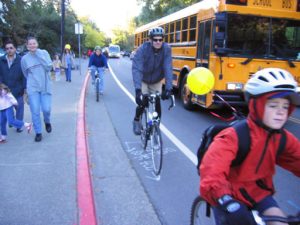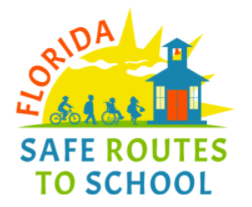
This September, about 2.8 million children will return to Florida’s public schools – on foot, on bicycles, on scooters, on skateboards. In whatever way they get there, the SRTS program is dedicated to giving children a safer journey from home to school and back again as well as encouraging more walking and biking.
University of Florida Transportation Institute (UFTI) researchers Dr. Nithin Agarwal, Dr. Siva Srinivasan, and Dr. Ruth Steiner have received funding from the Florida Department of Transportation (FDOT) to develop a master plan for Florida’s Safe Routes to School (SRTS) program. The UFTI has been involved with SRTS for several years. From the beginning, the state of Florida emphasized assisting rural communities with SRTS grants because those communities were less likely to have the funds and public works staffing to apply for support and implement safe routes. UFTI and other UF centers conducted research and developed tools to support the program and help promote field-tested solutions.
Dr. Agarwal, Director of the UFTI Technology Transfer (T2) Center and serves as the Principal Investigator (PI) on this project, said, “The needs of schools vary in different jurisdictions within the state, and the objective of this grant is to develop a data-driven framework to identify and prioritize improvements for schools that encompasses all the 5 Es, and this effort directly supports the FDOT’s Strategic Highway Safety Plan.” Dr. Steiner is the Co-principal Investigator on this project and has worked closely with the Florida’s SRTS program for decades. The UF team will leverage its network of partners, including the Community Traffic Safety Teams (CTST), IFAS, and leaders from local agencies, to solicit input on the framework.
In addition to the master plan, Dr. Agarwal and his team will produce an online course that will bring training to the widest possible audience in the state. Currently, communities seeking SRTS support are required to participate in training that introduces them to available educational resources for school and community, grant application processes, best practices, and more. FDOT’s program administrator, Sarita Taylor, delivers these trainings throughout the state, often with more requests than can be personally fulfilled. The UFTI research team, who are specialists in traffic safety and community issues, have been asked by FDOT to create a virtual program that will take SRTS training to a wider audience and facilitate implementation of SRTS in more communities. The virtual platform makes it possible to expand the range of training that can be delivered and further help communities adopt SRTS and implement it successfully.
All these efforts are part of several changes that will take place in Florida’s SRTS program, including changes in how the program is administered. FDOT has also asked the UFTI researchers to create a roadmap for Florida SRTS to guide the program as it moves forward into this new approach and to help assure that SRTS moves steadily towards its goals of making Florida’s school children healthier and safer.

As part of taking SRTS into its next phase, Dr. Agarwal and team are taking a fresh look at the program. For example, they are identifying new partners, such as UF IFAS Extension, which has the Family
Nutrition Program that operates in 40 Florida counties. The primary focus of that program is food and nutrition, but it has a community health component with goals that overlap SRTS’s. Once people begin to eat better, they may also want to improve their health through an increase in physical activity. Partnerships like this may help increase grassroots support for SRTS and pedestrian safety in general.
SRTS began in the 1990s with pilot programs in several U.S. cities and one state. The state was Florida, which created the statewide pilot program Florida Safe Ways to School. As the pilot programs proved their benefits – improving safety, increasing exercise, reducing traffic congestion – SRTS was expanded by Congress to a 50-state program in 2005.
To learn more about this project, please contact Dr. Nithin Agarwal at nithin.agarwal@ufl.edu
